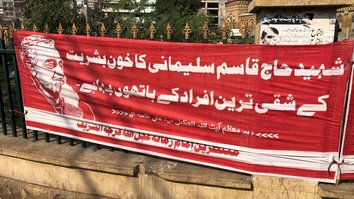Pakistan has created a special investigation team to probe the assassination of a Saudi diplomat in Karachi in 2011 linked to a banned Iran-backed Shia militant outfit.
Gunmen on motorcycles shot and killed Hassan al-Qahtani, an official at the Saudi consulate, in Karachi's upscale Defence area on May 16, 2011.
The assassination came five days after unidentified assailants threw hand grenades at the Saudi consulate in Karachi, where al-Qahtani worked, though no injuries were reported.
The attackers in both incidents escaped.
![A Saudi government delegation led by Saudi Ambassador Nawaf Bin Saud Al-Malki on November 17 meets with Pakistani Interior Minister Sheikh Rasheed Ahmad to discuss a probe into the assassination of a Saudi diplomat in Karachi in 2011. [Pakistani Interior Ministry]](/cnmi_pf/images/2021/11/19/32713-image__1_-585_329.jpg)
A Saudi government delegation led by Saudi Ambassador Nawaf Bin Saud Al-Malki on November 17 meets with Pakistani Interior Minister Sheikh Rasheed Ahmad to discuss a probe into the assassination of a Saudi diplomat in Karachi in 2011. [Pakistani Interior Ministry]
Pakistani authorities have transferred the probe to the Sindh Police's Counter Terrorism Department (CTD), which on November 13 formed a committee headed by Deputy Inspector General (DIG) Omar Shahid Hamid to investigate the killing.
Raja Umar Khatab, who heads the CTD's Transnational Terrorist Cell, Ali Raza, who oversees the Shia Militants Cell, and representatives of various military and civilian intelligence agencies are also part of the committee.
Pakistani Interior Minister Sheikh Rasheed Ahmad also assured Saudi Ambassador Nawaf Bin Said Al-Malki in a meeting on November 17 that the CTD's investigation team would "present its report within 30 days."
The main objective of reopening the probe and handing it over to the CTD is to unmask groups that want to stoke tensions between Pakistan's Sunni and Shia communities and between Saudi Arabia and Pakistan, a CTD officer said on the condition of anonymity.
"The probe has been declared a matter of 'extreme national importance'," the officer added.
Pakistani officials have linked the outlawed Sipah-e-Muhammad Pakistan (SMP), a Shia terror outfit that allegedly has received support and funds from the Iranian regime, to both attacks.
Various reports have pointed to Iran's involvement in the killing of al-Qahtani.
In a report submitted to Sindh's Home Department in December 2018, Pakistani police officials probing the assassination said that the three main culprits involved in the killing were members of the Al-Mehdi faction of the SMP.
Three other suspects are now hiding in Iran, said the report.
Saudi officials, citing Pakistani intelligence reports, have also said the attacker was an SMP member, noting that the terror outfit is linked with the Quds Force of Iran's Islamic Revolutionary Guards Corps (IRGC), which directs Tehran's external operations, the Washington Post reported in October 2011.
Pakistani officials and security analysts have been sounding the alarm over the growing threat of Iranian intelligence activities inside Pakistan and their implications for relations between Islamabad and Riyadh.
Saudi Arabia on October 26 pledged to provide $4.2 billion in assistance to Pakistan, providing relief to the South Asian nation as the value of the Pakistani rupee drops to an all-time low.
Shia militants
Pakistan's law enforcement agencies, including the CTD, have intensified a crackdown on Shia militant groups accused of fueling sectarian violence in Pakistan and sending youth to fight abroad, particularly in Syria.
In August, the CTD announced the arrest of Syed Ali Raza Naqvi, an alleged member of the SMP, in Karachi's Aisha Manzil neighborhood.
Naqvi had been involved in the killings of religious scholars and members of rival Sunni sects in Karachi for the past three decades, according to Israr Awan, a CTD officer.
"The arrested militant is associated with the proscribed SMP and had been in contact with fighters of the Zainabiyoun Brigade, a militia made up of Pakistanis sent to fight in Syria in support of al-Assad's regime," Awan said.
In January, CTD also arrested Abbas Jafri, a "most-wanted" accused Zainabiyoun Brigade militant, during a raid in Karachi.
Jafri, in addition to carrying out reconnaissance for terrorist activities in Karachi, was allegedly involved in recruiting Shia youth and sending them abroad to fight in wars directed by the IRGC, say police.
The US Treasury Department in January announced sanctions against the Zainabiyoun Brigade as part of efforts to "shut down the illicit networks the [Iranian] regime uses to export terrorism and unrest across the globe".
Such Shia militant groups, particularly the SMP and Zainabiyoun Brigade, receive Tehran's backing as part of an effort to extend Iranian influence in the region, according to Pakistani law enforcement.
The CTD in June published the latest edition of its Red Book, a listing of wanted terrorist and militant suspects, naming 24 SMP members and four militants of the Zainabiyoun Brigade.

![Pakistani police officials inspect the bullet-riddled vehicle of Saudi diplomat Hassan al-Qahtani after a deadly attack in Karachi on May 16, 2011. [Rizwan Tabassum/AFP]](/cnmi_pf/images/2021/11/19/32721-000_del477995-585_329.jpg)






